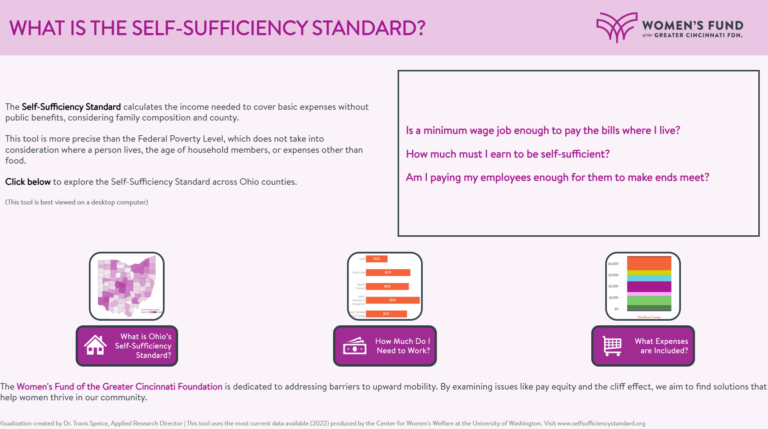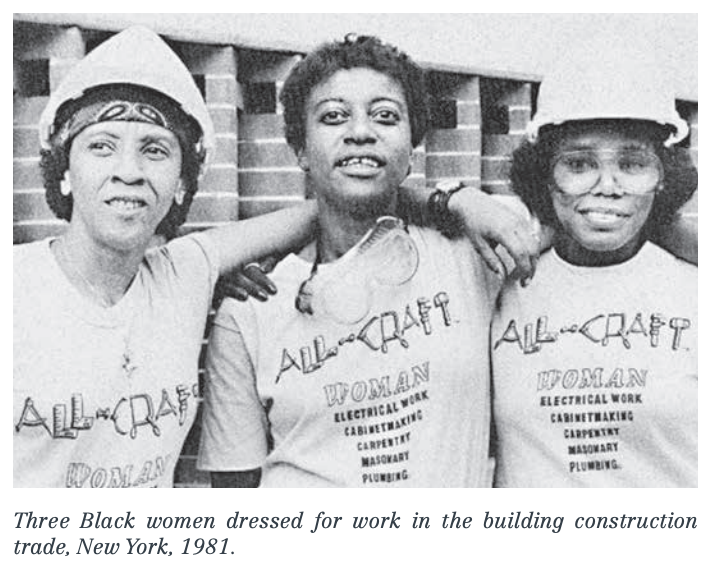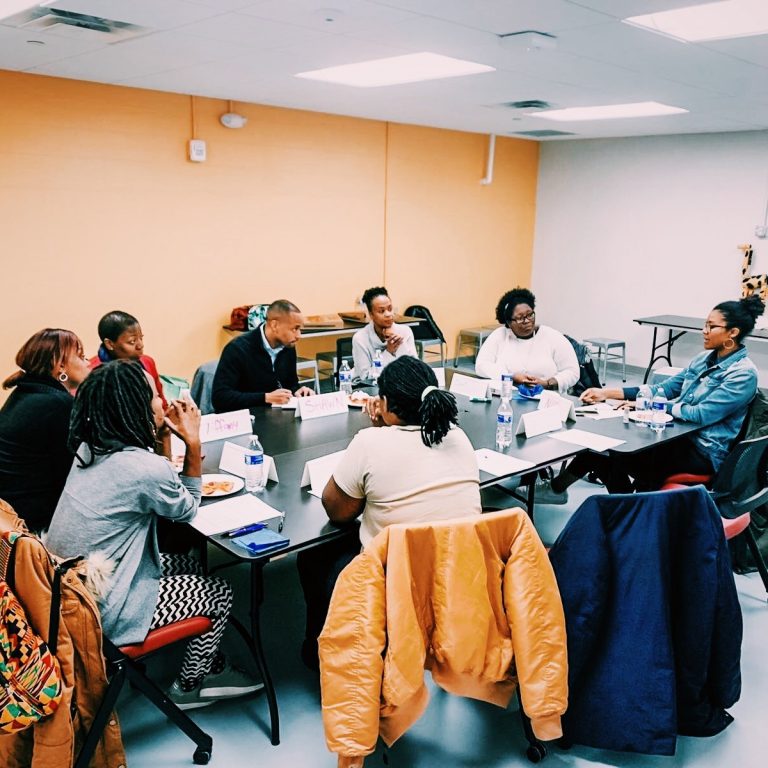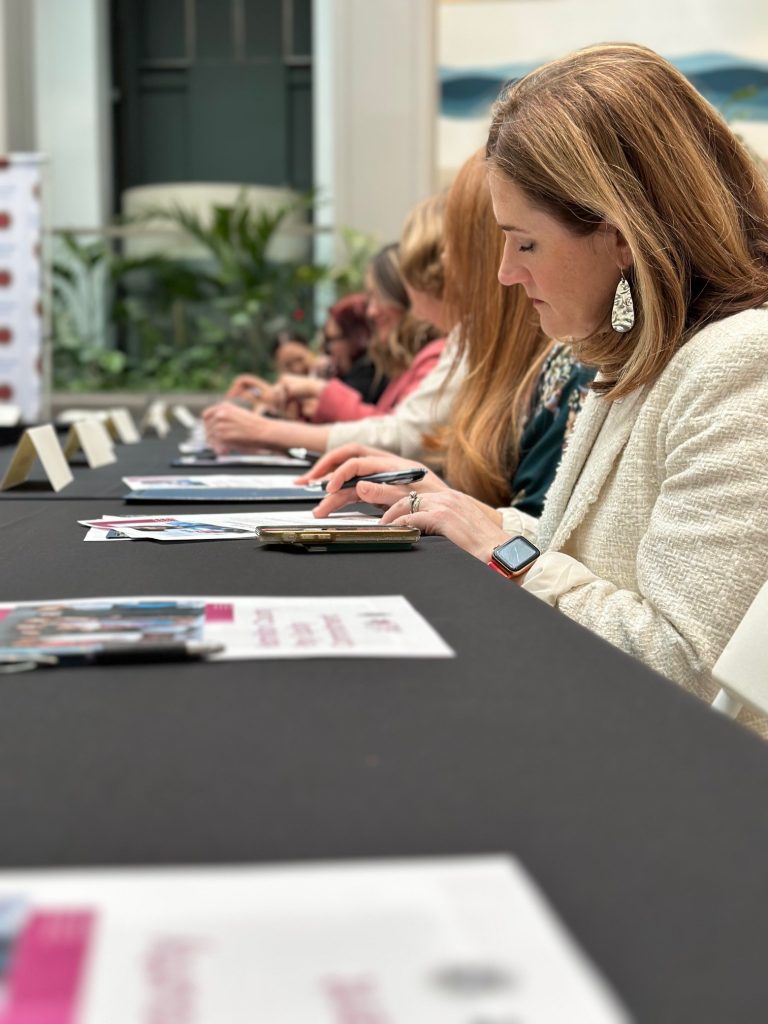Our Research & Advocacy
The Region’s Expert on the Status of Women’s Economic Self-Sufficiency
To speed the pace of change for gender equity, we need have a deep understanding of the data and illuminate the obstacles and opportunities through research. Our research informs and drives systemic policy change for women in our region and helps elected officials design legislation that effectively addresses issues of employment, living wage, child care, and education and training for working women. Our work is non-partisan and grounded in evidence and data.
We believe equitable policies build equitable communities.
Self-sufficiency in Ohio: The Gap Between Wages and Reality
See how wages, expenses, and policies impact financial stability – and what we can do to create lasting change
The Self-Sufficiency Standard is a powerful tool that calculates the real cost of living in every Ohio county, based on family size and local expenses. Unlike the Federal Poverty Level, this data gives a more accurate picture of what families need to be economically stable.
Explore the interactive tool to see how self-sufficiency varies by location and household size. Use this information to advocate for change, support workers, and shape policies that help all Ohioans thrive.

Black Women's Economic Mobility Project

Cliff Effect
The Cliff Effect is a threshold where a family or individual becomes ineligible for public benefits due to a small raise or promotion, causing their total gross resources to decline. It creates a disincentive for individuals to transition off public benefits and negates the primary objective of these programs— to help lift people out of poverty. Many people who experience the Cliff Effect comment, “I’m working harder and harder, but never seem to get ahead.” The journey to self-sufficiency is a long and complicated one that makes a family economically fragile. Even small financial gains have a potentially negative consequence.
The Women’s Fund began studying the Cliff Effect in 2012 and has produced four research reports diving deeper into this topic. It is also a key focus of our advocacy efforts. The Cliff Effect is a complex issue, involving dozens of government programs at the local, state and federal levels. While there is no easy answer, the Women’s Fund works hard to educate and collaborate with elected officials, business leaders and community partners to understand and identify critical solutions.

Pay Equity
In 2017, we commissioned a study by the Economics Center at the University of Cincinnati to examine pay disparities in our region.
In March 2019, Cincinnati City Council passed a law prohibiting employers in the City of Cincinnati from asking job applicants about salary or wage history, preventing historic gender and racial disparities from following an employee from one job to the next job.
The Women’s Fund was a key partner in the passage of this legislation in the city of Cincinnati, providing research and context outlining its benefits.
Read our one-pager to learn about the IMPACT OF THE SALARY HISTORY BAN
Read more about our support for THE SALARY HISTORY BAN
Read more about our PAY EQUITY RESEARCH
Read more about our PAY TRANSPARENCY RESEARCH
Read our new one-pager about PAY TRANSPARENCY

Our Advocacy
All advocacy efforts advanced by the Women’s Fund are non-partisan, grounded in evidence and data, conducted with respect and civility for all and advance the cause of women’s economic self-sufficiency. Because we know that the importance of women’s self-sufficiency is not a red issue or a blue issue; it’s a purple issue—one that should be a community imperative.
Our Policy Priorities
The issues most critical to us are those impacting women’s economic self-sufficiency. So many issues fall into this category, and we have learned over the years that the more we focus, the more effective we are. We concentrate on issues involving employment, wages, education and training, and child care. We currently prioritize the following issues in our advocacy efforts.
- Cliff Effect and Public Benefits Reform… because our benefit system should support a pathway to self-sufficiency for individuals experiencing economic hardship
- Affordable, Accessible Child Care and Paid Leave…. because like roads, bridges and the internet, this is basic infrastructure to support workers in our economy
- Ensuring a Living Wage by Reducing Occupational Segregation and Increasing the Minimum Wage… because full-time work should be sufficient to support your basic needs
- Pay Equity… because an employee’s race or gender should have no impact on their paycheck
- Applying a Gender and Racial Lens on Public Policy… because “neutral” is not enough. Our systems demand intentional policy-making to achieve a more equitable society.
Want to Learn More?
Invite us to speak: Our team is available to speak on any of our advocacy or research initiatives! Contact us via email at womensfund@gcfdn.org
Gain access to our research library: Our team collects national and regional research on economic self-sufficiency! Contact Applied Research Director Dr. Travis Speice at travis.speice@gcfdn.org
Advocating with us: Contact Advocacy Director Holly Hankinson at holly.hankinson@gcfdn.org
Our Policy & Advocacy Activities
- 2021 - Ohio House of Representatives Families, Aging & Human Services House Bill 145 Testimony
- 2020 - Advocated for the prioritization of child care funding in Federal COVID-19 relief legislation
- 2020 - Supported passage of City of Cincinnati gender-neutral changing table legislation
- 2020 - Conducted local, state and federal advocacy in support of unemployed and low-wage workers during early stages of COVID-19 crisis
- 2020 - Produced topline findings and recommendations with the City of Cincinnati Gender Equality Task Force
- 2020 - Supported federal legislation that would ensure paid sick leave for workers during and after a public health emergency
- 2020 - Endorsed Issue 7 Transportation Ballot Initiative
- 2019 - Supported passage of City of Cincinnati’s Salary History Ban
- 2019 - Advocated for the expansion of the Federal Earned Income Tax Credit and Child Tax Credit
- 2017 - Supported development of the Hamilton County Commission on Women & Girls
- 2017 - Supported formation and provided leadership for the City of Cincinnati Gender Equality Task Force
- 2016 - Endorsed Cincinnati Preschool Promise Ballot Initiative
Our Research Studies
- 2024 - Benefits and Costs of State Refundable Earned Income Tax Credits
- 2023 - The Economic Impacts of Restricted Abortion Access in Ohio (Concise report)
- 2023 - The Economic Impacts of Restricted Abortion Access in Ohio (Full report)
- 2023 - Pay Transparency Measures in the United States (Research and Executive Summary)
- 2021 - The Influence of Gendered Racism and Understanding Economic Fragility for Black Women in the Cincinnati Region (Summary)
- 2021 - Praxis Matters' Report on Black Women's Economic Mobility in Cincinnati
- 2021 - Realizing the Potential of an Equitable Economy Centering Black Women's Upward Mobility in the Cincinnati Region
- 2020 - Analysis of Black Women's Historical Labor Trends and Systemic Barriers to Economic Mobility
- 2020 - The Cliff Effect and Other Disincentives in our Public Benefit System
- 2019 - 2028 Jobs Outlook Report for Cincinnati MSA
- 2019 - Survey of Legislation to Ameliorate the Cliff Effect
- 2019 - Building Pathways to Economic Self-Sufficiency
- 2018 - Gender Diversity of Boards and Commissions
- 2018 - The Status of the Minimum Wage in the United States
- 2017 - Applying a Gender Lens to the Wage Gap
- 2017 - Unintended Consequences - Changing Workplace Policies to Support Low-Wage Employees
- 2016 - Teachers’ Wages: Critical to Quality Preschool
- 2016 - Outlining the Disincentives and Opportunity Costs for Working Mothers
- 2016 - Cliff Effect Qualitative Insights
- 2014 - 2020 Jobs and Gender Outlook
- 2012 - Women, Poverty and Cliffs
- 2012 - Poverty Indicator
- 2010 - Social Bonds Among Cincinnati-Area Girls
- 2009 - Developing Girls’ & Women’s Leadership
- 2007 - Women in the C-Suite
- 2005 - Pulse Report: A Study on the Status of Women and Girls in Greater Cincinnati